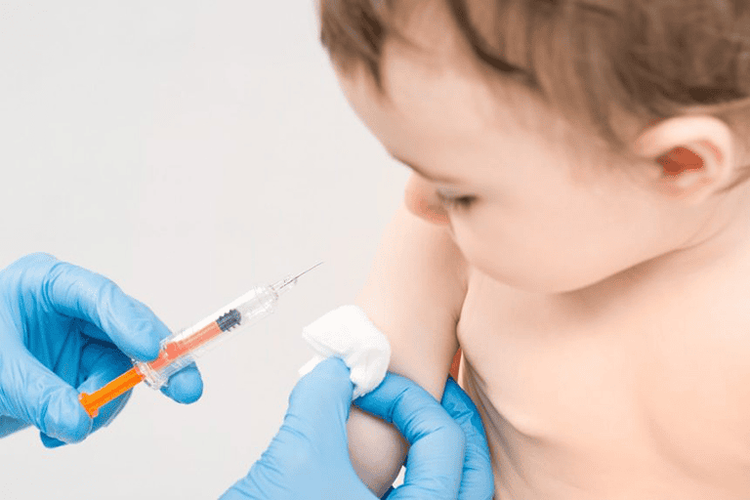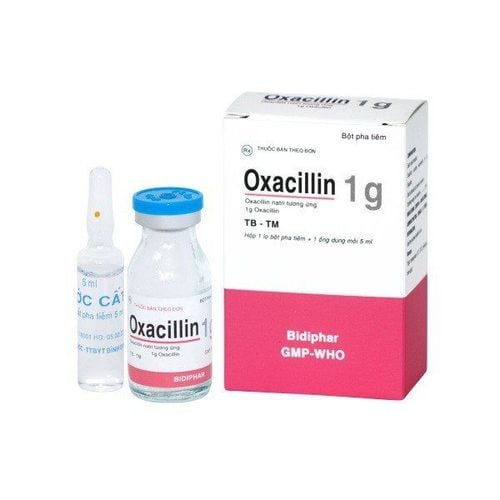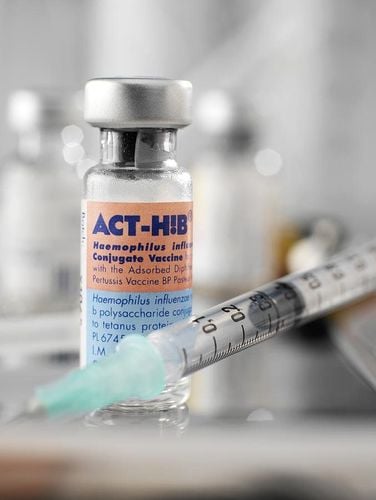This is an automatically translated article.
The article is expertly consulted by BS. Nguyen Hai Ha - Head of Vaccine Unit - Pediatric Outpatient Department - Pediatric Center - Vinmec Times City International HospitalPneumococcal vaccination is one of the most effective preventive measures against pneumonia, otitis media, meningitis, sepsis,... caused by pneumococcal disease. So, children with pneumonia, otitis media can get pneumococcal vaccine?
1. Pneumonia, otitis media caused by pneumococcal
Pneumococcal disease includes a group of diseases caused by the pneumococcal Streptococcus pneumoniae. There are many different strains of Streptococcus pneumoniae, many of which are resident in the nose, throat, and airways of healthy people (these people are called carriers). Each year, nearly half a million children under the age of 5 around the world die from pneumococcal diseases. Pneumococcal bacteria are the cause of many diseases such as pneumonia, otitis media, meningitis and many other diseases.Pneumococcus is spread through the respiratory tract, through droplets of saliva, nasopharyngeal secretions when coming into contact with an infected person through actions such as sneezing, coughing, kissing, or children playing with toys.
Otitis media is an infection of the middle ear. The disease is common in young children and often appears after diseases such as: Flu, measles, nasopharyngitis, sinusitis, V.A., tonsillitis, nasopharyngeal tumor, pneumonia, bronchitis,... The most common bacteria causing otitis media are: Streptococcus pneumoniae (S. pneumoniae), HiB bacteria (H. influenza type B), Staphylococcus aureus (S. aureus), M. catarrhalis. Pneumonia is an infection of the lungs, caused by bacteria or a virus. Streptococcus pneumoniae is one of the most common causes of bacterial pneumonia in children. Pneumonia is the leading infectious disease leading to death in children under 5 years of age worldwide.
2. Can children who have had pneumonia or otitis media get pneumococcal vaccine?
Many parents wonder whether to give pneumococcal vaccine to children who have pneumonia or otitis media? Many people think that children who have had pneumonia and otitis media will not get it again. It is true that the child's body will make its own immunity after being attacked by pneumococcal bacteria, however, there are 90 different types of pneumococcal bacteria and one type does not create immunity for the other, so when a child is infected with 1 type Pneumococci can still be infected with another type of pneumococcal disease at a later time. If precautions are not taken, each person will contract several different types of pneumococcal bacteria throughout their life.
Moreover, vaccination against pneumococcal helps prevent many diseases caused by pneumococcal not only otitis media, pneumonia. The vaccine can also prevent meningitis, bacteremia caused by the pneumococcal types contained in the vaccine. Therefore, children who have ever had pneumonia or otitis media should still receive the pneumococcal vaccine.

3. How many months can the pneumococcal vaccine be given?
Pneumococcal vaccine consists of 10 common pneumococcal antigens 1, 4, 5, 6B, 7 F, 9V, 14, 18C, 19F, 23F plus Hemophilus Influenza Unspecified Protein D. Pneumococcal vaccine is used for children from 6 weeks to 5 years old, depending on the age stage, there will be different injection regimens.
3.1. For infants from 6 weeks old to 6 months old: This age group can use 2 vaccination courses:
3 + 1 course: This is the recommended course for optimal effectiveness. The first dose can be started at 6 weeks of age. The second dose is at least 1 month apart from the first dose. And the third dose is at least 1 month after the 2nd dose. A booster dose (4th dose) is given at least 6 months after the third dose and is usually given after 1 year of age to achieve more optimal antibodies. For premature babies (at least over 27 weeks gestation) can use the 3 + 1 regimen when the baby is 2 months old. 2 + 1 course: Used to replace the 3 + 1 course, the first dose can be used for children 6 weeks old. The second dose is at least 2 months apart from the first dose. And the second dose should be repeated at least 6 months after the second dose. 3.2. For children from 7 to 11 months of age Where the Synflorix pneumococcal vaccine has not been previously administered, a schedule of 2 injections and 1 booster dose can be used. The first dose is on the day of starting the injection, the second dose is at least 1 month after the first dose. A booster dose is given when the child is older than 1 year and at least 2 months apart from the second dose.
3.3. For older children from 1 to 5 years of age In case of not previously vaccinated against pneumococcal Synflorix: 2 doses with at least 2 months interval between injections.
4. But be careful when giving pneumococcal vaccine to children
Possible side effects after injection:
Local reactions are more common in children > 12 months of age than in younger children. Adverse effects are usually more severe when co-administered with whole-cell pertussis vaccine. Common: fever > 38 degrees Celsius, pain, swelling, redness or stiffness at the injection site. In a very small number of cases, the child's spirit may be stimulated, there is a feeling of loss of appetite. Symptoms can last for about 1-2 days but do not pose a danger to the health of the child, most side effects will go away on their own, so parents should not be too worried but skip the vaccination - a method of prevention. most active and effective today.
For very rare manifestations such as unusual fussiness, diarrhea, vomiting, rash, hematoma at the injection site, rapid breathing, difficulty breathing, cyanosis, anorexia, high fever over 39-40 degrees Celsius, use antipyretic drugs difficult to lower temperature or other signs of allergy: parents need to take the child to the nearest medical center for timely intervention.
5. Why should children give Synflorix pneumococcal vaccine at Vinmec?
Vinmec International General Hospital as well as the vaccination system in the Vinmec clinic chain provide the Synflorix vaccination service, which is made in Belgium. The advantages of vaccination at Vinmec include:
Children will be examined by pediatricians - vaccines, fully screened for physical and health problems, and advised on vaccines. disease prevention and injection regimen, how to monitor and care for children after vaccination before giving the indication for vaccination according to the latest recommendations of the Ministry of Health & World Health Organization to ensure the best effectiveness and safest for children. A team of experienced and professional pediatric doctors and nurses, understand children's psychology and apply effective pain relief methods for children during the vaccination process. 100% of vaccinated children were monitored for 30 minutes after vaccination and reassessed before leaving. Undertake medical supervision before, during and after vaccination at Vinmec Health System and always have an emergency team ready to coordinate with the vaccination department to handle cases of anaphylaxis, respiratory failure - circulatory arrest, ensuring Ensure timely and correct handling when incidents occur. The vaccination room is airy, with a play area, helping children feel comfortable as if they are walking and have a good mentality before and after vaccination. Vaccines are imported and stored in a modern cold storage system, with a cold chain that meets GSP standards, keeping vaccines in the best conditions to ensure quality. Parents will receive a reminder message before the vaccination date and their child's vaccination information will be synchronized with the National Immunization Information System. In addition, Vinmec International General Hospital also offers a Package Immunization Program with a variety of vaccines for different audiences, from infants, young children, adults, women before and during pregnancy.
6. Instructions for booking a vaccination appointment at Vinmec
Option 1: Book an appointment via Call Center
You directly contact the switchboard of the Hospital or Vinmec Clinic nationwide.
Vinmec Times City Hospital (Hanoi): Hotline: 02439743556 Vinmec Central Park Hospital (HCMC): Hotline: 028 3622 1166 Vinmec Nha Trang Hospital (Khanh Hoa): Hotline: 0258 3900 168 Vinmec Ha Long Hospital ( Quang Ninh): Hotline: 0203 3828 188 Vinmec Hai Phong Hospital (Hai Phong): Hotline: 0225 7309 888 Vinmec Danang Hospital (Da Nang): Hotline: 0236 3711 111 Vinmec Phu Quoc Hospital (Kien Giang): Hotline: : 029 7398 5588 Method 2: Book an appointment online
Visit website www.vinmec.com and book an appointment according to the instructions HERE. Option 3: Book an appointment directly
You can book an appointment directly at Vinmec Hospitals and Clinics nationwide according to the list HERE.
Please dial HOTLINE for more information or register for an appointment HERE. Download MyVinmec app to make appointments faster and to manage your bookings easily.














